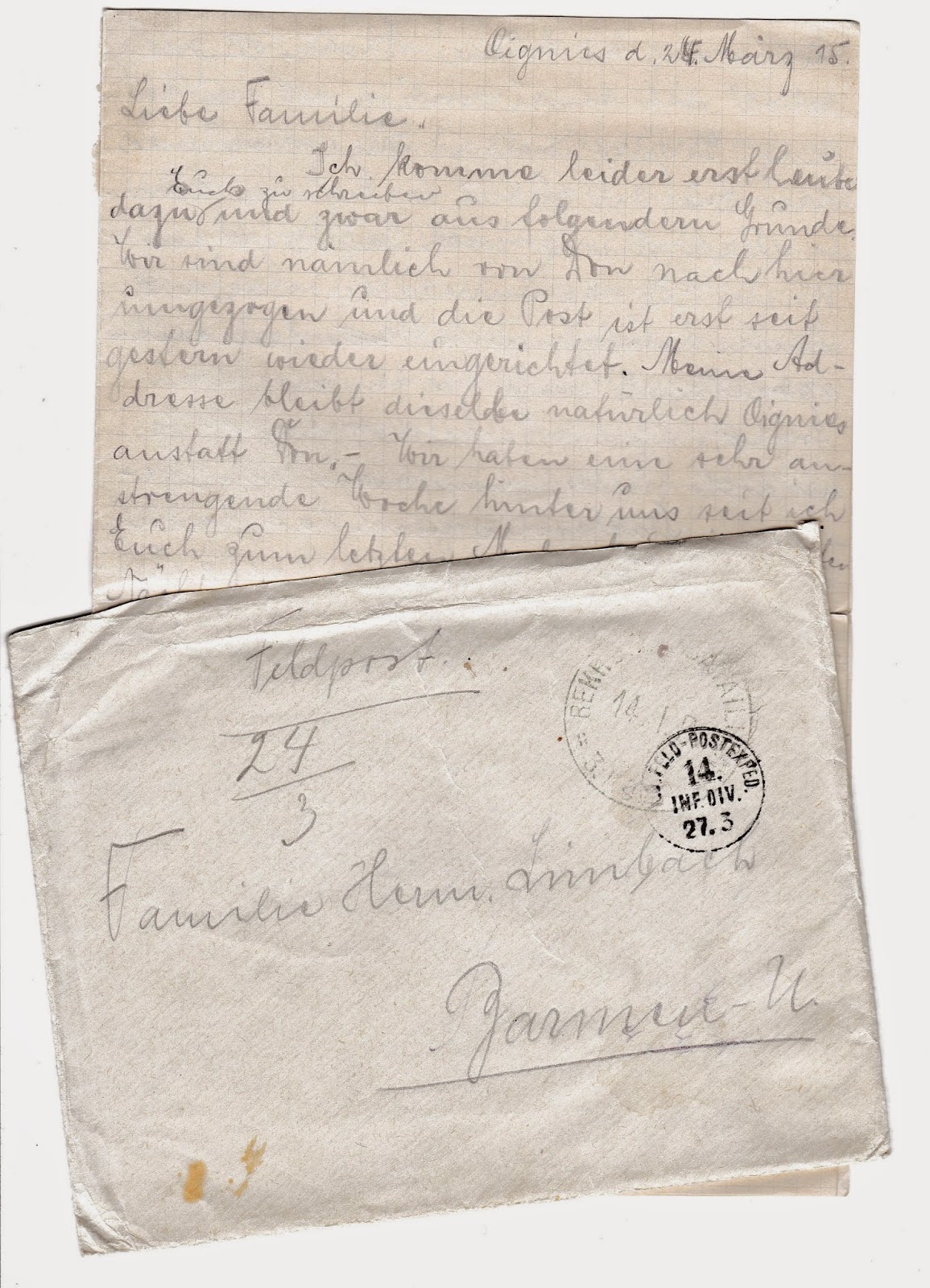Oignies, 24 March 1915
[Wednesday]
Dear Family,
I only now have time to write to you,
because we have moved from Don to here, and the postal service only started
working again yesterday. My address will stay the same, but of course with
Oignies instead of Don.
We’ve had a tough week since I last
wrote you. The last nights of last week we built barbed wire defences at
Illies, as I probably already wrote you. It was very interesting and we’ve
learned a lot.
I can now build such a defence quite
easily. The defences we build there are ofcourse not as stable and neat as the
ones you’ve seen in Borkum, but nevertheless the English will have problems
getting through them.
The last few nights work progressed
quicker than in the beginning. We worked platoon-wise, and the first platoon to
finish got to go home first. Our platoon was always the first to finish, and
our Leutnant enjoyed that very much
of course.
But I’m glad this job is over. It’s
not nice when your sleep rhythm get disturbed. It was especially no fun anymore
saturdaynight. Coming home at 3 in the morning, and then getting up again on Sundaymorning
at 6, pack up, and then in full marchinggear a 3 hour march to where we are
now.
I was really happy when we finally
arrived.
Billets here are better than in Don.
On the whole Oignies is a better village. It’s near Carvin and Courrières,
where they had that mining accident a few years ago, and where we then sent
oxygen.[*1]
You can see on the enclosed postcard
what it looks like here. Don looked the same, only poorer[*2]
We are billeted in a theatre,
spacious and light. [*3] Especially the washingfacilities are much better, so now we
can wash regularly again. You won’t believe how much we value that now.
Close by is a large garden and park,
and it’s lovely Spring-weather.
Duty is getting a little sombre
and boring. We don’t learn anything new anymore. So our training will be over
shortly I think. Which is good on the one hand, but on the other hand not so
good.
Whether we will be attached to
Regiment 56 or Regiment 16 has not been decided yet. Both are stationed around
here actually. The 56’ers near La Bassée and the 16’ers near Illies, both opposite
the English.
We’ll just have to wait for the
outcome, and let’s not grow any grey hairs over it.
At the moment I’m on guardduty at a
bridge over the canal, from 1 o’clock this afternoon untill tomorrowafternoon 1
o’clock. There are six of us, and we’re relieved every 2 hours. During the day
there’s always one person on duty, at night it’s two. We have to check the
passes of the civilians to see whether they are allowed to cross the bridge,
that’s all.
Parcel-wise I have received nrs 45 –
49 if I recall correctly. With all the goings on here I don’t quite know it
anymore. Furthermore I received a parcel from Aunt Jülchers, the Bonerts, Aunt
Lise, A Weyerbuschs, Emmi Heun, and Clara Guthmann and the Nettelbecks. Will
you please thank them all for me. I don’t have time or inclination to write to
them all. I’m usually very tired in the evening.
For the rest I’m doing fine. The
cold has gone completely. I hope father is doing well too.
It serves no purpose to worry so
much. It won’t change anything and he only hurts himself. Now that the
coldstores are rented out completely, and there being enough feed for the
horses, everything is in good health isn’t it?
The slight set-back is nothing
compared to the factories that have been destroyed by the war. I’ve seen here,
just behind the front, how the villages suffer from the war. There is hardly
anything left of Illies, Herlies etc (I’m sure you will be able to find those
places on the map). Nobody lives there anymore.
If you realise that then you should
be very pleased with your current life. It could have gone the other way,
although that is not really possible or likely. Those villages really look horrific.
In Illies a perfume factory has been
completely destroyed. The big bottles scattered on the streets, and the whole
village smelled of it. But that smell is way better than that of the dead and
half-buried Englishmen in the village square, where we dug trenches for the
second time.
I didn’t really want to write you
that, but one gets a bit indifferent towards these things.
At the moment we’re having a great
time and a coffee at a lady’s house, who already speaks very good German.
But enough for today.
With many greetings also to all
acquaintances I am your Fritz
[*1] The Courrières mine disaster, Europe's worst mining accident, 10 March 1906.
[*2] The postcard Fritz sent with
this letter has been lost over the years unfortunately.
Here’s a typical postcard of
Oignies from that time:
[*3] Perhaps the white Art Nouveau building on the left is the "Varieté saal" Fritz writes about as being his billets?
The legend on the façade reads "Cinema Parlant Alcazar" ("Talking cinema Alcazar"), so this is a post-war picture.
Cityhall is on the right.
and the situation in August 2012 (thanks to Google Streetview)





Fritz always has time to educate us. I had not heard of that mining disaster before.
ReplyDeleteP.S - The email system which alerts me to new posts on this blog has failed.
De stedenband tussen Herne en Hénin-Beaumont is er niet zomaar één uit 2.200. De vriendschap begon in 1906, met de meest dodelijke mijnramp uit de Europese geschiedenis. In dat jaar ontplofte een deel van de steenkoolmijn van Corrières, vlakbij Hénin, in het departement Pas-de-Calais. De explosie en de grote brand die daarop volgde kostten 1.100 mijnwerkers het leven.
ReplyDeletehttps://www.volkskrant.nl/nieuws-achtergrond/het-geheim-van-de-frans-duitse-vriendschap-praat-niet-over-religie-of-politiek~b775a9fe/